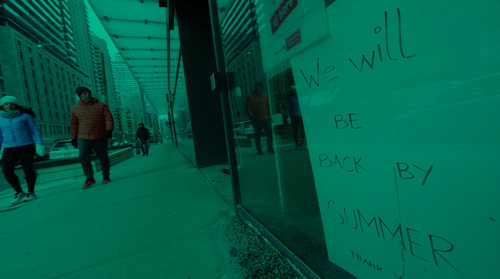In recent weeks, professors at the Rotman School have shed light on a range of issues, including how to stimulate economic growth, matching personal protective equipment (PPE) supplies with demand effectively, and what life after social distancing will look like.
As economists explore new ideas on how to stimulate growth, Walid Hejazi, an associate professor in the Economic Analysis and Policy area, made the case for embracing the principles of Islamic finance, where products and services are based on sharing the risk equitably, are backed by hard assets, and do not involve charging interest and investing in ‘sinful’ industries. In a recent Globe and Mail op-ed, co-written with Mohamad Sawwaf (MBA ‘15), Hejazi pointed out that Islamic financial institutions tend to perform better than their counterparts during economic downturns.
Meanwhile, Joel Baum and Tim Rowley, professors in the Strategic Management area, argued that data will be key to effectively fighting the COVID-19 crisis in their recent Toronto Star op-ed. The two explained how random testing is required for determining an accurate infection rate and infection fatality rate.
RELATED

From the Globe and Mail

From the Toronto Star
Opher Baron, a Distinguished Professor of Operations Management, revealed how he and his colleagues at the Rotman School — including Professors Philipp Afèche, Ming Hu, and Dmitry Krass — leveraged their expertise in supply chain management to tackle the ongoing PPE shortage. A recent Toronto Star article described how their recently launched platform, CovidPPEHelp, is aimed at matching PPE suppliers with customers efficiently.
TVO’s The Agenda with Steve Paikin summarized key ideas presented during a recent Rotman webinar called Reopening the Economy: How Organizations Can Prepare for a New Normal. This virtual talk featured Dean Tiff Macklem and Professors Anita McGahan and Nicola Lacetera.
Professor Joshua Gans’s new book, Economics in the Age of COVID-19 (MIT Press), has attracted attention. Gans, who is a professor of Strategic Management and the Jeffrey S. Skoll Chair of Technical Innovation and Entrepreneurship, recently spoke about the book and his thoughts on life after the lockdown in a segment with BNN Bloomberg. The Financial Times cited a few of the points Gans made in his book in their analysis of Europe’s economic future. Gans also commented on why governments should introduce incentives for getting citizens to install contact tracing apps in an article for the Australian Financial Review.
RELATED

From the Toronto Star

COVID PPE Help

From the Agenda
Anita McGahan, a University Professor and professor in the Strategic Management area, recently shared her thoughts on what life after the COVID-19 crisis could look like. She spoke to BNN Bloomberg on how we could see more mindful consumer spending and declining demand for air travel. She expanded on the complex challenges of reopening the economy and keeping customers and workers safe with the London Free Press. Also, she and David Soberman, a professor in the marketing area, considered the practicalities of how to reopen business operations in Canada in an article for the Toronto Star.
Geoffrey Leonardelli, a professor of Organizational Behaviour and Human Resource Management, discussed whether work-from-home setups will be more widely embraced. As he explained to the Australian, after the lockdown, organizations will need to investigate how to create equal opportunities for all employees, whether they are based in the office or working remotely.
Richard Florida, a University Professor and a professor in the Economic Analysis and Policy area, discussed what reopening cities could look like with Global News and the Toronto Star. He recently examined how urban tech industries have fared during the COVID-19 crisis. While urban delivery and urban informatics services have thrived, co-working spaces and rental apps have suffered. As he and coauthors explained in a Fast Company op-ed, "the larger takeaway is that urban technology will play a crucial role in determining which cities thrive, and which ones falter, in the wake of COVID.”
RELATED

From the London Free Press

From the Toronto Star

From Fast Company
More Rotman Insights →